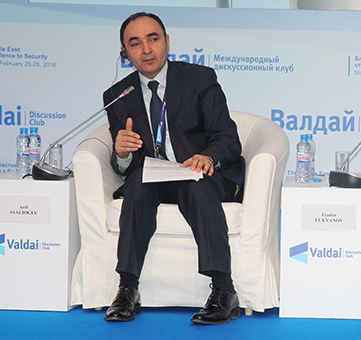07 Jun 2016

On 24 November 2015 a Turkish F-16 fighter shot down a Russian Su-24 bomber on the border with Syria. In an instant this incident destroyed Russian–Turkish relations, which even a day earlier had been on a higher level than ever before in the history of the two countries over the past century. It can be said that 24 November 2015 opened a new page in the history of the two countries’ relationship, recalling the days of the Cold War.
The Russian bomber, which was stationed at a military base in Syria, where Russian ships and aircraft have long been based and by all appearances will continue to be based, was shot down for violating Turkish airspace for 17 seconds. Moreover, as the Russian side maintained, “the plane was shot down four kilometres from the border, inside Syria”. Instead of shooting the plane down the Turkish fighter could have forced it to leave Turkey’s airspace, if such a violation had indeed occurred. Then the relationship would not have been damaged and a crisis could have been averted, but as we all know, when it comes to history the subjunctive mood does not exist.
In his first speech after the incident Russia’s President Vladimir Putin said that this day would have the most serious consequences for Russian–Turkish relations, and he used some strong words reminiscent of the rhetoric of the Cold War era. Putin said, “Russia has been stabbed in the back by the accomplices of terrorism.” After his statement the Russian Ministry of Defence published a video recording of the Russian plane’s flight, which showed there had been no violation of Turkey’s airspace. The video recording showed the plane’s flight path, the approach of Turkish fighters, the moment the blow was struck, and a graphic image of the plane’s flight. Thevideo recording also shows that the plane was inside Syria’s borders when it was hit.
Vladimir Putin and Dmitry Medvedev emphasised that Turkey is not only a neighbouring state but also a country that they had considered a friend. They made some toughstatements: “We know that Turkey is buying a significant quantity of oil from IS.” Another point that very strongly offended the two leaders – and this could be sensed in their speeches – was that immediately after the plane had crashed Turkey reported the fact to NATO, not Russia.
Once it became known that the downed plane was Russian, this tragic incident was all over the news. Criticism by official authorities and ultimatum-like statements poured in with increasingly intense and grave rhetoric. Every statement made by the two sides in essence pointed up the inevitability of a steep fall in bilateral trade, which had reached almost 40 billion dollars, which would lead to an inevitable worsening of the crisis in both countries.
Russia’s Foreign Minister Sergei Lavrov announced that he had cancelled his visit to Turkey scheduled for 25 November 2015. A decision was taken to cancel the meeting of the Russian–Turkish High-Level Cooperation Council, which was due to take place in St Petersburg in mid-December 2015. In the evening of the same day a statement by the Russian Ministry of Defence appeared, stating that all military contacts with Turkey were to cease. The head of the Russian tourism agency issued a statement saying that Russian tourists should not visit Turkey. Major Russian tour operators such as Natalie Tours and Anex Tour have stopped selling trips to Turkey. The Russian football association has decided to cancel all its winter training camps in Turkey. Protests have begun outside the Turkish Embassy in Moscow. The Russian Foreign Ministry has stated that Turkey is not a safe country for citizens of Russia.
A list of sanctions applying to supplies of food products has been announced. The Russian government has made arrangements to strengthen controls on foodstuffs and agricultural produce being supplied to Russia and has recommended that the Russian sanitary control service bring in additional procedures for checking all Turkish produce at customs points. Russia has banned the sale of Turkish chickens and turkeys with effect from 1 December 2015. I believe the impact of the crisis on trade relations with be felt much more in a few months’ time. Dmitry Medvedev has orderedthat a package of measures be drawn up in response to Turkey’s actions. This package of special economic measures was presented to Vladimir Putin personally and will come into effect on 30 December 2015.
On the same day the Russian squadron in the Mediterranean Sea sent a warship equipped with the S-300 anti-aircraft system to the coast of the region where the Russian plane was shot down. A S-400 system has been deployed at the Hmeimim military base in Latakia since 26 November 2015. This means that Russia will continue to destroy all groups and formations considered terrorists on the border with Turkey with the aid of the S-300 anti-aircraft system and its modified version the S0499, which is designed to destory short-, medium- and long-range missiles.
Russia and Turkey are now displaying hostility in relation to each other in all their contacts. This hostility has already moved beyond the states’ ideologies and has become a personal problem between the two countries’ presidents. The rhetoric of Vladimir Putin and Russian state officials is characterised by condemnation not so much of Turkey as of Recep Tayyip Erdogan personally, and this shows that while Erdogan is in power, relations between Russia and Turkey cannot be restored.
The political crisis has not been slow in affecting the economy too. The tragic conflict between Russia and Turkey has dealt a painful blow to the markets in both countries. The Turkish lira has fallen by 3.71% against the dollar in a week, and the Russian rouble by 2.48%. The stock markets in both countries are down, the Instanbul market losing 6.25% in a week and the Russian 3.60%. The Russian stock market closed the week with a fall of 2.10% and dropped to 856,300 points, while the Istanbul stock market closed the week with a rise of 0.85% to 75,638 points.
It’s also obvious that Russia and Turkey have been pushed back many years in terms of trade, energy, security and regional projects. It will be a very long time before they can return to their previous level of relations. Moscow and Ankara have lost confidence in their relationship, and if there is a further escalation in the crisis the politics of many countries in the region, from North Africa and Central Asia to the Balkans, will start to undergo structural changes.
In spite of everything the two countries need each other in many industries – from tourism and construction to foodstuffs and energy. Turkey is more dependent on Russia than Russia is on Turkey. Turkey is an energy-dependent country, and its energy system is tied to Russia. Turkey buys significant quantities of natural gas, oil and coal from Russia. If the political crisis moves into an energy crisis and we start to see interruptions to energy supplies, Turkey might run into difficulties. The natural gas supplied to Turkey is used for generating electricity and for heating. Annual imports of gas into the country stand at 49.2 billion cubic metres, the greater part of which comes from Russia.
The sequence of sweeping changes in countries that are geographically close to Turkey and Russia has favoured the development of multi-dimensional cooperation between the two countries. Bilateral relations were developing in the economy, politics and culture, and therefore regional crises had a minimal negative impact on the development of relations. Later, social links began to develop, which acted as a catalyst for the development of closer relations at all levels. The leaders used to stress at their frequent meetings that the strategic aims of the partnership were to develop the energy sector, transport services and military cooperation.
In response to the tough official statements that followed the incident of 24 November, the two countries’ business circles, public organisations, institutions and citizens have begun to call for calm and a sensible approach in resolving this situation, and for dialogue to be continued. According to unofficial data, about 50,000 Turkish citizens are living in Russia and about 300,000 Russians are living in Turkey. The number of Russian–Turkish mixed marriages is now in excess of 100,000. The sanctions that have been announced will have a negative impact on the lives of these people above all. It is important to continue dialogue in order to soften the mutual rhetoric and to prevent possible risks in the future. In this respect the most important tool is public diplomacy. There should be a special focus on public organisations, cultural centres and business people’s associations, which could now fulfil this most important of all missions.
Russian International Affairs Council (RIAC)




19 декабря 2023 года Международный институт развития научного сотрудничества «МИ ...
14 и 15 ноября в отеле «Националь» в Москве проходит III Международный форум «СМ ...
30 октября 2023 Центр научно-аналитической информации Института востоковедения Р ...
С 18 по 20 октября в Казани пройдет шестой международный «Медиафорум-2023: свобо ...
10-11 октября в Белграде прошла IX Международная встреча интеллектуалов на тему ...
